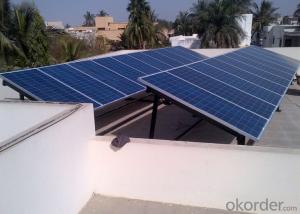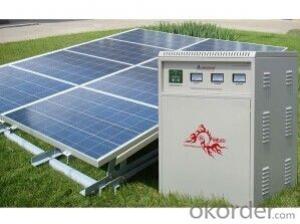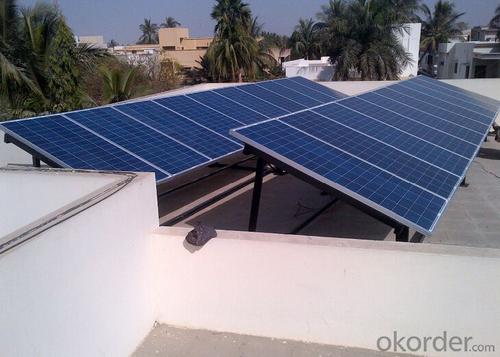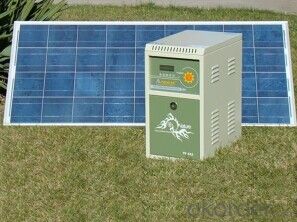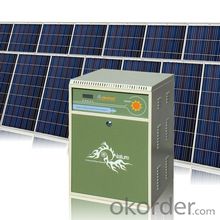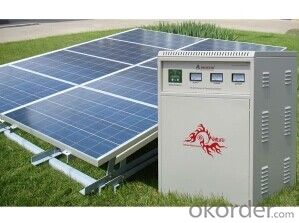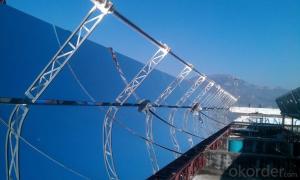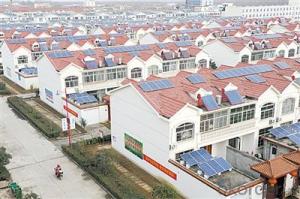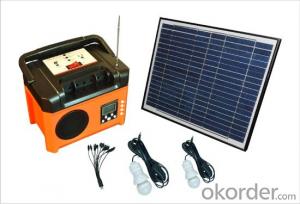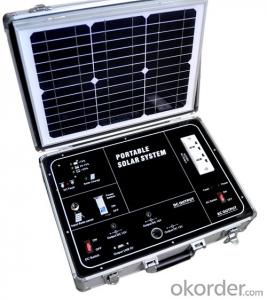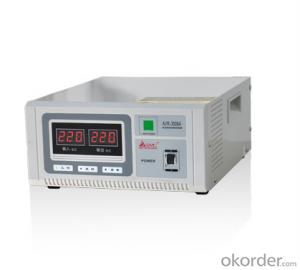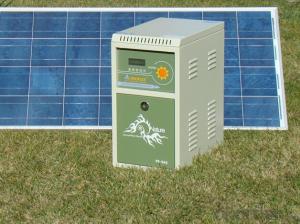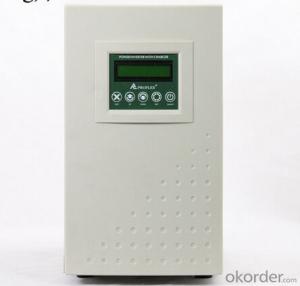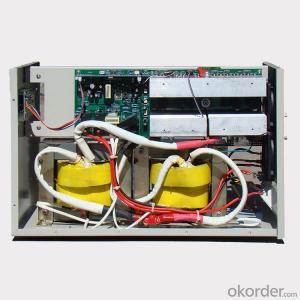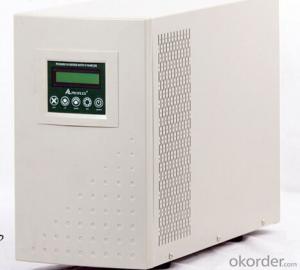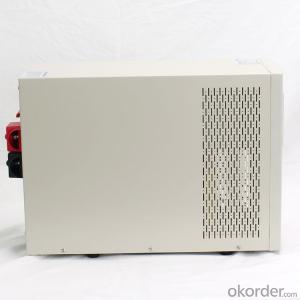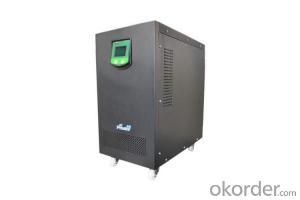Solar Energy Systems Alaska - Off Grid Solar Power System PR-SAS500 with Battery Tank 400W
- Loading Port:
- Tianjin
- Payment Terms:
- TT OR LC
- Min Order Qty:
- 10 pc
- Supply Capability:
- 10000 pc/month
OKorder Service Pledge
OKorder Financial Service
You Might Also Like
Specification
Specifications
1.Supply 2 work modes: to save electricity bill or to supply long time power backup.
2. Supply battery tank,high integrated.
Daily use reference
TV 70W x 4 hours
Lighting 30W x 6 hours
Fan 50W x 6 hours
Laptop 60W x 2 hours
Total loading power: 210W
Total power consumption per day: 880Wh (0.88kWh/day)
AC solar power system consists of solar batteries, solar controller, battery, inverter components.
Used to solve rural or remote areas without electricity, such as highland, island, pastoral, villas, border posts and other military and civilian life electricity.
Warranty
CNBM Solar panel provides one of the most comprehensive module warranties in the industry:
· 10 years for product defects in materials and workmanship
· First 12 years for 90% of warranted minimum power
· Remaining 25 years for 80% of warranted minimum power
Certification
CNBM Solar panel strictly carries out the ISO 9001 quality control methodology and has implemented check points at every step of the production process to ensure our product performance durability and safety. The stringent quality control process has been confirmed by numerous independent agencies and LDK Solar modules earned IEC, TUV and UL certifications.
· IEC:IEC 61215, IEC 61730 (1&2), conformity to CE
· UL 1703 2002/03/15 Ed:3 Rev:2004/06/30
· ULC/ORD-C1703-01 Second Edition 2001/01/01
· UL and Canadian Standard for Safety Flat-Plate
· ISO 9001: 2008 Quality Management Systems
· CEC Listed: Modules are eligible for California Rebates
· PV Cycle: Voluntary module take back and recycling program
· MCS Certificate
FAQ
l Where can I buy your products?
You could find our products from dealers or contact our sales team directly. We will provide you with detailed services.
l How to contact us?
Contact details can be found from website www.okorder.com to contact us. We look forward to providing you with professional services.
l What is the application field of your products?
They can be used in the small photovoltaic (PV) grid power generation systems of family units as well as the commercial photovoltaic system such as BIPV, BAPV and etc.
l What kinds of modules do your inventers support?
Our inventers support most of mainstream components and modules in the market. Should you require more details, please do not hesitate to contact our technical personnel.
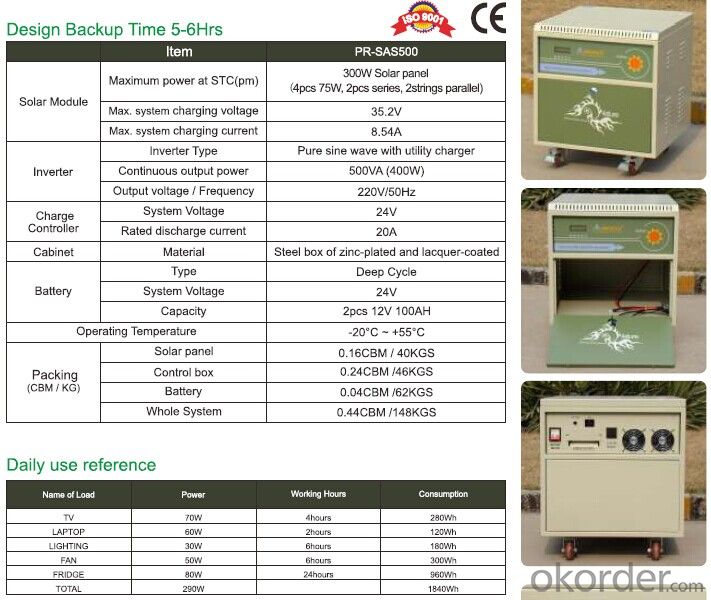

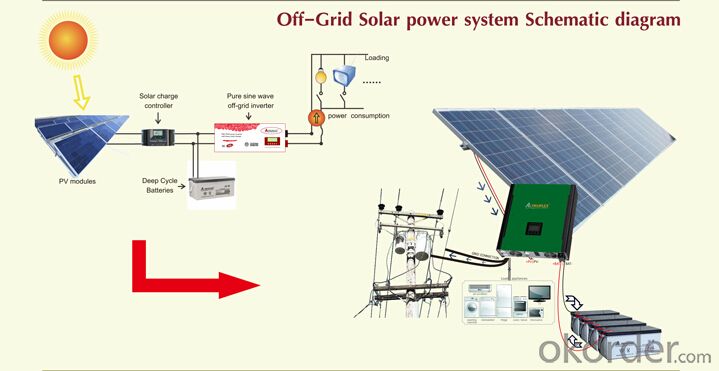
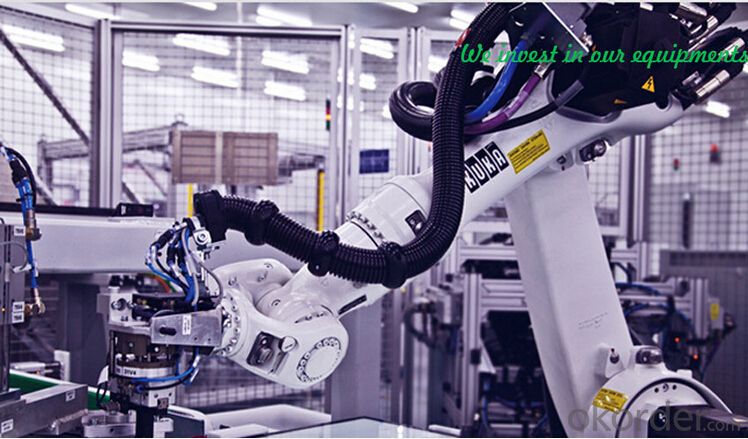
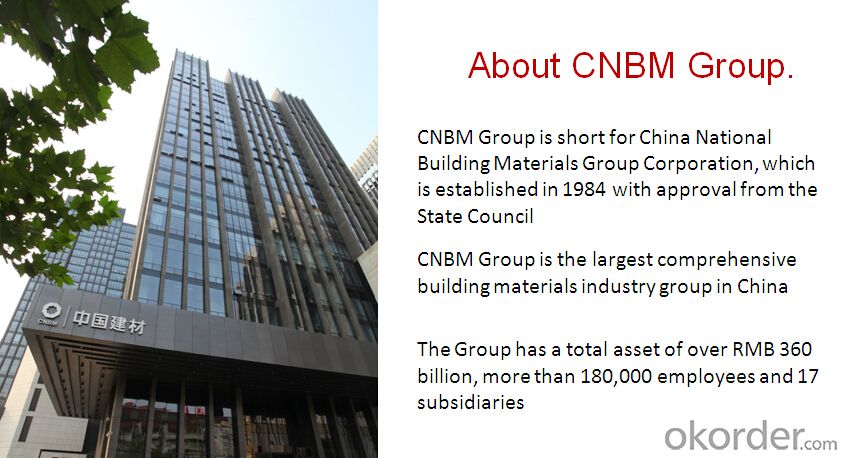

- Q: Can a solar energy system be installed in areas prone to hailstorms?
- Yes, solar energy systems can be installed in areas prone to hailstorms. However, it is essential to consider certain factors to ensure their durability and resilience against hail damage. This includes using high-quality materials, such as tempered glass for solar panels, and proper installation techniques. Additionally, some solar panels are specifically designed to withstand hail and extreme weather conditions, providing further protection.
- Q: Can solar energy systems be used for powering off-grid eco-hospitals?
- Yes, solar energy systems can be effectively used for powering off-grid eco-hospitals. Solar panels can be installed to harness and convert sunlight into electricity, providing a sustainable and renewable source of power. This can help reduce dependency on traditional energy sources and mitigate the environmental impact of hospitals. Additionally, solar energy systems can be combined with battery storage solutions to ensure a continuous power supply even during periods of low sunlight or at night. This makes solar energy an ideal choice for off-grid eco-hospitals, promoting both environmental sustainability and energy independence.
- Q: What is the role of solar energy systems in reducing energy poverty?
- Solar energy systems play a crucial role in reducing energy poverty by providing access to clean, affordable, and sustainable electricity in off-grid and underserved communities. These systems, such as solar panels and solar lanterns, offer an alternative to fossil fuel-based energy sources, which are often expensive and unreliable in developing regions. By harnessing the power of the sun, solar energy allows individuals and communities to meet their basic energy needs, such as lighting, heating, and powering small appliances. This not only improves their quality of life but also creates opportunities for education, healthcare, and economic development. Additionally, solar energy systems empower individuals to become self-sufficient energy producers and reduce their dependence on centralized energy grids, ultimately contributing to a more equitable and resilient energy future.
- Q: Are solar energy systems expensive to install?
- Solar energy systems can be expensive to install initially, but they offer long-term benefits and savings on energy bills. The cost of installation depends on various factors such as the size of the system, location, and available incentives. However, with the decreasing cost of solar technology and potential for government incentives, the overall cost has become more affordable in recent years. Additionally, considering the long lifespan and the potential to sell excess energy back to the grid, solar energy systems can be a wise investment in the long run.
- Q: Can solar energy systems be used for heating water in commercial buildings?
- Yes, solar energy systems can be used for heating water in commercial buildings. Solar water heating systems use the sun's energy to heat water, which can then be used for various applications including heating water for commercial purposes. These systems typically consist of solar collectors that absorb sunlight and convert it into heat, which is then transferred to a storage tank to provide hot water. This renewable and sustainable approach can help reduce energy costs and carbon emissions in commercial buildings.
- Q: Can solar energy systems be used for large-scale power generation?
- Yes, solar energy systems can be used for large-scale power generation. Solar photovoltaic (PV) power plants, also known as solar farms, are capable of generating a significant amount of electricity. These power plants consist of a large number of solar panels that convert sunlight into electricity. With advancements in technology and economies of scale, the efficiency and cost-effectiveness of solar energy systems have improved, making them viable for large-scale power generation. Additionally, solar energy is a renewable and clean source of power, making it an attractive option for reducing carbon emissions and transitioning to a more sustainable energy future.
- Q: What is the role of solar energy systems in promoting sustainability?
- Promoting sustainability is a crucial function of solar energy systems as they offer a clean, renewable, and abundant source of energy. Unlike fossil fuels, solar energy systems do not emit harmful greenhouse gases or contribute to climate change. Instead, they generate power without producing any pollution or emissions. This not only helps to mitigate the negative impacts of climate change but also reduces reliance on finite fossil fuel resources, which are depleting rapidly. In addition to their environmental benefits, solar energy systems also contribute to sustainability by decentralizing energy production. Unlike traditional energy sources like coal-fired power plants, solar energy systems can be installed on rooftops or in close proximity to where the energy is needed. This reduces energy losses during transmission and distribution, resulting in improved overall efficiency. Moreover, solar energy systems enable individuals and communities to become more self-sufficient and less dependent on centralized energy grids. By producing their own electricity, households and businesses can lower their energy bills and have a more stable and reliable energy supply, especially in remote areas or during power outages. This decentralization also enhances energy security and resilience, as it reduces vulnerability to disruptions caused by natural disasters, cyber-attacks, or other emergencies. Furthermore, solar energy systems have a long lifespan and require minimal maintenance, leading to lower operational costs compared to conventional power generation technologies. This makes solar power an economically viable option, particularly in the long term. As the cost of solar panels and related technologies continues to decrease, more individuals, businesses, and governments are investing in solar energy systems, further driving adoption and creating a positive feedback loop for sustainability. Beyond the environmental and economic benefits, solar energy systems also have social implications. They provide access to electricity for underserved communities or those lacking reliable energy sources. This can improve the quality of life, support economic development, and create educational opportunities, particularly in developing countries. In conclusion, solar energy systems play an integral role in promoting sustainability through their reduction of greenhouse gas emissions, improvement of energy efficiency, enhancement of energy security, and facilitation of economic development. By harnessing the power of the sun, we can create a more sustainable future for future generations.
- Q: What is the lifespan of a solar energy system?
- The lifespan of a solar energy system typically ranges from 25 to 30 years.
- Q: Can solar energy systems be used for powering electric boat charging stations?
- Indeed, electric boat charging stations can utilize solar energy systems for power. Sunlight is captured by solar panels and converted into electricity, enabling the charging of electric boat batteries. The charging infrastructure can be directly powered by installing solar panels on the roofs or nearby areas of the stations. This approach not only makes the stations environmentally friendly by utilizing renewable energy, but it also enhances their independence and sustainability by reducing reliance on the power grid. Furthermore, employing solar energy in electric boat charging stations can result in long-term cost savings, as the electricity generated from solar panels becomes free once the initial installation expenses are recouped.
- Q: Can solar energy systems be used in areas with limited access to solar energy advocacy campaigns?
- Yes, solar energy systems can still be used in areas with limited access to solar energy advocacy campaigns. While advocacy campaigns can help raise awareness and support for solar energy, the installation and use of solar energy systems ultimately depend on the availability of sunlight. Even in areas with limited access to advocacy campaigns, solar energy systems can still be implemented as long as there is sufficient sunlight to generate electricity through solar panels. In fact, installing solar energy systems in such areas can bring numerous benefits, such as reducing reliance on fossil fuels, providing access to clean and renewable energy, and potentially lowering energy costs.
Send your message to us
Solar Energy Systems Alaska - Off Grid Solar Power System PR-SAS500 with Battery Tank 400W
- Loading Port:
- Tianjin
- Payment Terms:
- TT OR LC
- Min Order Qty:
- 10 pc
- Supply Capability:
- 10000 pc/month
OKorder Service Pledge
OKorder Financial Service
Similar products
Hot products
Hot Searches
Related keywords
